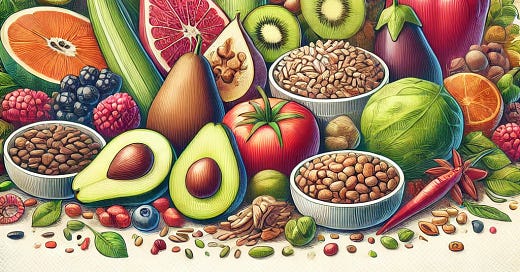TLDR - Fiber can act as a prebiotic, promoting good bacteria. It can also cause harm if your have a compromised digestive system.
Types of Fiber
Soluble Fiber: Dissolves in water to form a gel like substance. Found in oats, peas, beans, apples, citrus fruits, carrots, barley, and psyllium.
Insoluble Fiber: Promotes the movement of material through your digestive system and increases stool bulk, which can be beneficial for those with constipation or irregular stools. Found in whole wheat flour, wheat bran, nuts, beans, cauliflower, green beans, and potatoes.
Fiber and Gut Bacteria
Fiber acts as a prebiotic, feeding the bacteria in your digestive system. This can be both good and bad:
Flourishing Good Bacteria: When your gut is populated with beneficial bacteria, fiber helps these microbes thrive, producing short chain fatty acids that nourish the gut lining and support immune function.
Feeding Bad Bacteria: If your gut is compromised with an overgrowth of harmful bacteria, increasing fiber intake can inadvertently feed these bad bacteria, potentially worsening gut health issues.
Larger Stools and Digestive Burden
Fiber increases stool bulk because it is not fully digested by your body and must be eliminated through your stool. While this is beneficial for regularity, it can pose a burden on those with compromised digestive systems. For individuals with severe digestive issues, a sudden increase in fiber can exacerbate symptoms such as bloating, gas, and discomfort.
The Importance of Gut Health Before Increasing Fiber
Cleaning Up Your Gut: Before increasing fiber intake, its important to first reduce pathogenic bacteria and fungi through dietary changes and my digestion protocol.
Gradual Increase: Once your gut health is optimized, gradually increasing fiber intake can help prevent any potential negative effects and allow your digestive system to adapt.



